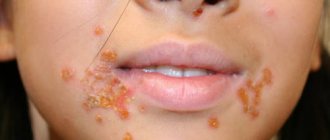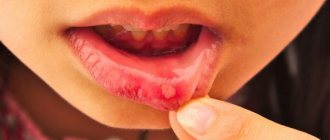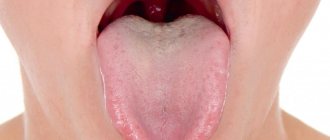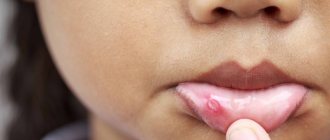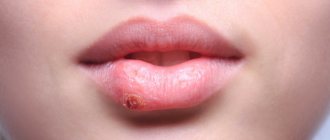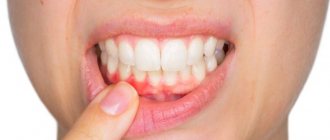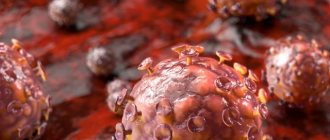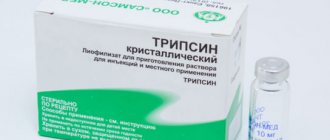Excessive passion for strong drinks will never be beneficial for a person. And no matter what supporters of the “harmlessness and benefit” of alcohol claim, even drinks that contain ethyl alcohol taken in minimal quantities are potentially dangerous. There is no need to list all the diseases caused by ethanol - there are too many of them. Alcohol can also provoke unusual pathologies, which do not become safer because of it.
We are talking about a phenomenon in which the tongue in the throat swells after drinking alcohol; lovers of strong alcohol especially often encounter this syndrome. Such an unusual reaction of the body causes well-founded fear, because sudden swelling and inflammation indicate the development of some pathology, which, if timely and competent measures are not taken, can lead the drinker to death. In this article we will look at what to do if such situations arise.
Inflammation of the uvula often occurs due to alcohol
Functions of the uvula
This is a small cone-shaped process. The tongue is located in the oral cavity on the edge of the palatine part (slightly above the root of the tongue). The organ consists of a muscular and connective structure covered with a mucous membrane. The uvula separates the laryngeal and pharyngeal regions and has several important functions:
- Protects the nasopharynx area from accidental ingress of liquid or food (during swallowing).
- Does not allow you to choke while eating (when you touch hard particles of the tongue, it spasms, stopping the entrance to the respiratory tract).
- Controls the process of food entering the digestive system, stopping the involuntary desire to regurgitate food/liquid back.
There are people who do not have a palatal tongue at all (due to operations, any pathologies or congenital anomalies).
The absence of this part of the oral cavity does not affect the standard of living, but increases the chances of choking and suffocation when eating . After all, the safety of swallowing movements is ensured by the simultaneous movement of this structure and the palatal part. When healthy, the tongue is pale pink in color and small in size. But what to do when it grows, swells and hurts? Can alcohol become a provocateur of its inflammation and how can the condition of the organ be brought into order?
The uvula belongs to the organs of the oral cavity
How to get rid of an allergy to alcohol?
The first step is to determine which alcoholic drink causes the allergy. Knowing the allergen, you can decide which drinks you can drink if you have allergies and which you cannot.
If a rash and redness appear on the face after drinking alcohol (whiskey, cognac), it means that the patient has an allergic reaction to tannins or fusel oils.
If the allergy appears after drinking beer, there is probably an intolerance to brewer's yeast or malt. Often such people have food allergies and drug allergies to penicillin.
What, even for beer?
Scientists say: approximately 1% of the world's population is allergic to beer, which is associated with the body's reaction to one of the proteins in barley.
During the fermentation process in wine and beer, histamine is formed - a substance that triggers allergic reactions in the body for all types of allergies, from pollen to contact allergies. Red wine contains even more histamine. Yes Yes! Unfortunately, wine contains not only the truth, but also a whole “bouquet” of allergens. Some of them are contained in raw materials, others end up in the drink during factory production.
Information for wine lovers
Allergic reactions to red wine are more common in people suffering from bronchial asthma and allergic rhinitis.
An allergy to grapes can cause anaphylaxis to grape wine. It has been scientifically proven that allergies to grape wine occur in people with latex allergies and allergies to grape pollen.
To clarify wine, substances with a high allergenic index are used - egg white, gelatin, milk casein and others, which pose a great danger to people with food allergies.
Proteins from insect venom and fungi that live on grape bunches can also become allergens. These substances enter the wine during pressing of grapes.
Sulfur dioxide, sulfites or other components of wine can cause an allergic reaction.
By the way, about sulfites: these substances are one of the main “provocateurs” of allergies to alcoholic beverages. It is known that high concentrations of sulfites are found in wine, beer and cider and can provoke an attack of bronchial asthma, Quincke's edema, and urticaria. In addition, they can be found in dried fruits, shrimp and almost all cosmetics.
Allergies to vermouth often occur in people suffering from hay fever, for example, with an allergy to wormwood or sunflower.
Almond liqueur and mulled wine are dangerous alcohol if you are allergic to almonds. With pollen and food allergies to barley, an allergy to beer may occur.
Champagne lovers may also experience an allergic reaction. The fact is that this sparkling drink, beloved by many, contains strong allergens: mold and yeast, as well as various additives: flavor enhancers, sweeteners, etc.
Whatever they mix!
A large number of additives are added to cheap alcohol: dyes, essences, thickeners - these are the ones that often cause allergies in adults and adolescents.
Oddly enough, it is even possible to have an allergy when drinking vodka, especially if it contains flavorings or dyes. Maybe you can “deal” with artisanal alcohol? Chacha, moonshine and mash can also hardly be called safe, so it’s better not to risk your health!
“But this is all here, but in Europe...”
According to European scientists, in 15% of cases it is alcohol that causes anaphylaxis, and most of the toxic effects of ethyl alcohol are associated with alcohol abuse.
Main symptoms
If the uvula has enlarged due to inflammatory processes, as the pathology develops, the patient will experience a number of other symptoms. In particular:
- gagging;
- difficulty breathing;
- pain and itching when swallowing;
- rash on the skin;
- fever, fever;
- painful belching and heartburn;
- problems with speech functions;
- soreness in muscles and joints;
- the appearance of white formations on the tongue;
- increased salivation and lacrimation;
- feeling of a lump in the throat (or a foreign object);
- persistent dry cough with inability to clear throat.
The swelling of the uvula sometimes reaches such a degree that the nasopharyngeal lumens are blocked. This situation leads to serious breathing situations and possible asphyxia (suffocation) . Therefore, the main thing that needs to be done in such a situation is to relieve swelling, preventing the inflamed organ from blocking the respiratory tract and bringing the patient to a critical situation.
If the uvula is swollen and inflamed, it is not recommended to cough heavily; the patient will not be able to clear his throat, and excessive tension will only aggravate the situation.
How does an allergy to alcohol manifest itself?
The more often an allergy is provoked, the more severely a person’s symptoms are tolerated each time.
Allergies on the face, neck, diarrhea, red spots on the body, burning in the mouth, swelling of the lips and tongue - this is how an allergy to alcohol manifests itself in most cases.
For people allergic to alcoholic drinks, drinking alcohol is undesirable: at one “wonderful” moment the body can react with life-threatening conditions - Quincke's edema or anaphylactic shock.
In the development of allergies, the key factor is the contact of the allergen (any substance in the air, food, clothing, etc.) with the body. Accordingly, minimizing or eliminating such contact prevents the development of the reaction, which explains the effectiveness of Enterosgel.
It is known that the intestines play a critical role in the functioning of the immune system. Enterosgel removes allergens from the gastrointestinal tract. In addition, Enterosgel removes bacterial endotoxin, promotes the regeneration of damaged mucosa and normalizes the intestinal microflora. Thus, the functioning of the intestines and immune system is restored, and allergic manifestations are reduced.
At the first signs of a possible allergy, you can take Enterosgel in a standard dose. Then use the drug according to the instructions for 1-2 weeks.
By the way…
If treatment with Enterosgel sorbent is started on time, severe anaphylaxis can be avoided.
An allergy to alcohol also manifests itself with other signs, not just redness on the face. In particular, after drinking alcohol the following may occur:
- suffocation;
- sweating;
- nasal congestion;
- stomach ache;
- headache;
- diarrhea;
- swelling of the neck, face;
- vomit;
- heartbeat;
- dry cough;
- skin itching;
- decrease in pressure.
Alcohol, like food allergens, plays a leading role in the development of chronic urticaria.
Most signs of allergy disappear after taking Enterosgel. Otherwise, medical attention is required!
The main causes of the pathological situation
Swelling of the uvula can develop under the influence of a fairly wide variety of factors. It is precisely the accurate identification of the cause of the inflammatory process that is the main thing in establishing the correct diagnosis and subsequent therapy. Swelling of this structure is formed both due to certain diseases and for reasons not related to illnesses.
The uvula ensures safety when consuming food and drinks
Diseases that cause swelling
Doctors identify the following, the most common culprits of this pathology:
- Diseases of an infectious nature of the oral cavity and nasopharynx.
- Some chronic diseases of the nasopharynx (tonsillitis, asthma, pharyngitis, otitis media).
- Paramygdaloid abscess. This is an acute purulent disease of the peri-almond tissue.
- Long-term dental problems (untreated caries, inflammatory processes, purulent infections).
- Injury to this area. Inflammation and subsequent swelling can result from an alcohol burn to the throat as a result of consuming too strong alcoholic beverages.
- Allergic manifestations. Increased sensitivity of the immune system and allergies arising against this background lead to swelling of sensitive mucous membranes. The delicate tissue of the uvula may also be damaged.
Situations not related to diseases
The development of uvulitis does not occur in all cases due to existing pathologies. If the uvula begins to swell, but there are no pathological reasons for this development of events, it is worth looking for the reason among other provocateurs. Experts advise analyzing the possible presence of factors such as:
- passion for smoking (uvulitis is a frequent companion of an avid cigarette addict);
- injury to the uvula mucosa from too hot/cold food or drink;
- chronic snoring (usually in this case, swelling forms in the morning, and by the evening everything returns to normal);
- the need for long-term use of certain aggressive medications that irritate the delicate mucosal tissue;
- Sometimes the throat hurts after drinking alcohol (especially if there is damage to the mucous membrane and when drinking too strong alcohol), such soreness is often accompanied by swelling.
The most dangerous culprit of swelling is the development of an oncological process . It can be suspected if, apart from the swollen tongue, the patient does not have all irritating factors or any diseases.
Alcohol often acts as a strong irritant to the oral mucosa, which leads to swelling and inflammation of the uvula
Types of allergies to alcohol
Hereditary predisposition plays a major role in the likelihood of any allergic reaction. A person whose parents have allergic diseases also becomes allergic in 80% of cases. This reaction of the body is called innate. By the way, intolerance to alcohol, as well as congenital allergy to alcoholic drinks, is more common among residents of Asian countries. Additionally, alcohol allergies are common in people with lactose intolerance.
A person “earns” an acquired allergy throughout his life as a result of exposure to external allergens (food, pollen, household dust, alcohol, etc.)
How to help in this situation
Treatment methods for a swollen uvula depend on the culprit of this pathological situation. Of course, if you have a lump in your throat after drinking alcohol, which is accompanied by pain and swelling, you should immediately stop drinking alcohol. Further treatment will consist of the presence of accompanying signs indicating the presence or absence of diseases.
Drug therapy
Methods for treating swelling of the uvula directly depend on the pathology that the victim had to face. In particular, the following medications can be used:
In case of allergic reactions . If the main culprit of uvulitis is an allergy, it is necessary to immediately exclude contact with the irritant allergen. By the way, sometimes the palate hurts after drinking alcohol precisely because of intolerance to a certain alcoholic drink. To stabilize the condition, medications such as:
- Zyrtec;
- Cetrin;
- Aleron;
- Diazolin.
If you have allergic reactions that manifest themselves in this way, you should definitely take care of your health and treat this situation extremely responsibly. Indeed, with uvulitis of allergic origin, there is a high chance of anaphylactic shock or Quincke's edema . These situations already pose a direct threat to human life. Such manifestations are relieved by injection of Prednisolone or Epinephrine.
Anaphylactic shock is one of the dangerous complications of swelling of the uvula
Diseases . When a certain viral or bacterial pathology is diagnosed with swelling of the palatal tongue, the patient will have to take a course of prescribed medications:
- in case of viral origin of the disease, Arbidol is more often prescribed;
- To combat a bacterial infection, Amoxiclav or Azithromycin is prescribed.
When pustular formations form in the area of the uvula, doctors resort to surgical removal. Fortunately, almost always the resulting growths are benign in nature. These are mainly cysts or polyps. Despite their safety, experts strongly recommend getting rid of them. Their complete removal helps relieve swelling, eliminates unpleasant symptoms and reduces the risk of various complications.
In the presence of polyps and cysts that formed as a result of swelling of the uvula, there is a chance of their degeneration into malignant formations. The risks of developing cancer are increased by alcohol consumption and smoking.
In case of severe pain syndromes, patients are also prescribed analgesics. How the therapy will proceed depends on the established diagnosis. The therapeutic course is developed individually, and medications are selected taking into account the clinical picture. Self-medication in this case is unacceptable. If time is lost and uvulitis already has a complicated form, the patient undergoes a tracheotomy. This is a procedure in which the trachea is opened and a special tube is subsequently installed to make breathing easier.
Help from traditional medicine
In the case when the swelling of the uvula does not have any serious pathological nature, then, along with the prescribed therapy, the use of healers’ recipes can also help. Swelling and inflammatory manifestations are relieved by regular gargling . To do this, it is recommended to use the following recipes:
- Viburnum decoction. Steam dried viburnum berries (50 g) in a liter of boiling water, bring to a boil and simmer over low heat for 30–40 minutes. Strain the finished medicine. Use warm.
- Infusion of sage and thyme. Take dry plants in equal proportions and steam the mass with hot water (200 ml). Bring to a boil and leave to steep for half an hour.
- Chamomile and calendula decoction. To make a healing rinse, you need to use the flowers of the crops. Mix equal amounts of calendula and chamomile. Pour boiling water (600 ml) over dry raw materials (25 g). Steam over low heat for about 15–20 minutes, cool and use for treatment (after straining).
In addition to these plants, a healing rinse can also be made based on other crops that have anti-inflammatory properties. It can be:
- marigold;
- yarrow;
- wormwood;
- Echinacea purpurea;
- large plantain;
- common sage;
- medicinal lavender.
But, before testing the medicinal properties of these crops on yourself, you need to consult a specialist. After all, some of the herbs and plants have a number of contraindications and cannot be used in all cases. It is worth remembering that many plant crops can provoke allergies, which will only aggravate the condition and provoke unnecessary complications.
You can also use ready-made pharmaceutical herbal preparations for mouth rinsing.
If alcohol is the main culprit for the swelling of the uvula, you should immediately stop drinking alcohol and completely detoxify the body. During the recovery period, it is recommended to increase your drinking ration. And in the future, it is necessary to take a responsible approach to the choice of alcohol and consume it exclusively in small quantities, carefully listening to your well-being .
So, let's try to figure it out - is there an allergy to alcohol?
Internal ethyl alcohol is a compound necessary for metabolism and energy, which regulates the permeability of cell membranes and helps the body adapt to stressful situations. So can you be allergic to internal alcohol? In fact, no, because it is the “brainchild” of the organism itself.
More often, allergies occur from alcohol taken orally. Theoretically, such reactions of the body are possible to all types of alcoholic products.
It is difficult to say when the first alcoholic drink appeared, perhaps at the same time as the first dishes. Our distant ancestors created the first varieties of wine and beer from grapes, honey and fruits.
Pure alcohol was obtained by alchemists in the Middle Ages and was called “alcohol,” which means “intoxicating” in Arabic. Did you already have an allergy after drinking alcohol? History is silent about this, but modern alcoholic drinks quite often become the cause of allergies.
There are allergies to preservatives, dyes, hops, tannins, malt, flavorings, yeast, wort and other substances that are used in the production of alcoholic beverages. The most “allergenic drinks” are considered to be cognac, beer, liqueur, wine and vermouth.
It is safe to say that the cheaper the alcohol purchased, the higher the risk of an allergic reaction due to the large number of dangerous additives.
Substances used to protect plants from parasites and fertilizers for a better harvest, if they get into plants, can cause an allergy to alcohol.
Allergens from fruits and berries from which the alcoholic drink is made also cause symptoms in people with food allergies.
Attention!
The rapid removal of ethanol breakdown products from the body with the help of Enterosgel sorbent will help avoid allergies from alcohol and alcohol poisoning.
Many organic (and inorganic) substances can enter alcoholic beverages during the technological process. It is from them that signs of skin allergies and digestive disorders appear.
By the way…
Ethanol is a good solvent for various substances that, when entering the body, begin to manifest their “allergic essence”. In other words, ethanol increases allergies. Moreover, alcohol can be very dangerous if you have allergies!
Ethyl alcohol also accelerates the absorption of allergens that enter the body with various products. It has been established that ethanol contributes to the occurrence of nutritional allergies in 12% of patients. A red face, rashes on the legs, torso and arms after drinking alcohol are quite common manifestations among allergy sufferers.
In addition to alcoholic beverages, ethyl alcohol is included in various medicines, hygiene and cosmetic products - because of this, allergic reactions often occur to them.
Alcohol and pregnancy
Drinking alcoholic beverages by a pregnant woman in the future provokes allergic diseases in children - asthma, dermatitis, rhinitis, and so on.
Let's summarize
Uvulitis, or swelling of the uvula, is a potentially dangerous phenomenon. It is worth remembering that with growing swelling there may be a threat to normal breathing and the possibility of suffocation. Therefore, you should act immediately in such a situation, especially considering that swelling can develop rapidly. Doctors consider uvulitis to be an unpredictable disease, but, fortunately, this pathology can be easily and quickly cured, of course, with the complete exclusion of provoking factors, some of which include smoking and consumption of alcoholic beverages.
How to cure an allergy to alcohol?
First of all, you need to stop drinking alcoholic beverages and consult a doctor. You should not look for treatment on the World Wide Web, rely on the experience of a neighbor, or act at your own discretion. Therapy is selected individually for each person, especially for people with alcohol addiction.
If signs of allergy appear after drinking alcohol, it is necessary to induce vomiting and rinse the stomach.
It is worth having Enterosgel in your home medicine cabinet - a proven medicine for effectively removing allergens and toxic substances from the body, although some are accustomed to relying on pills for alcohol allergies. Antihistamines will also help.
In severe cases, doctors prescribe intravenous infusions of detoxification solutions. To improve liver function, hepatoprotectors are prescribed.
Remember:
When starting to treat allergies, it is important to remember that many medications are incompatible with alcohol, and they should be taken only after eliminating alcoholic beverages! Otherwise, if you have allergy symptoms, you may also get an unpredictable response from the body.
Fasting days will help to cope with intoxication of the body: fruit, kefir-milk, vegetable.
